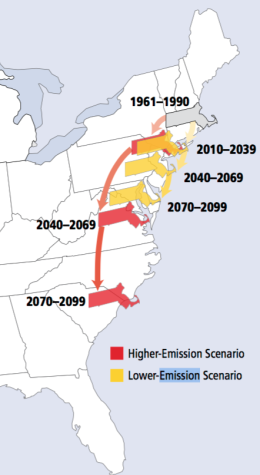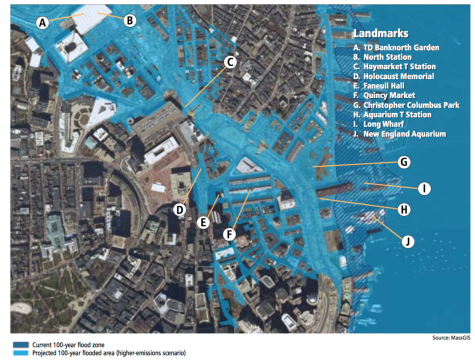Climate Crisis In New England

January 21, 2022
Since 1751, humans have put 1,615 gigatonnes of carbon dioxide into the atmosphere. A gigatonne is 1,000,000,000 tonnes of CO2. 831 gigatonnes came from the last 30 years, meaning that over the past 30 years, humans have emitted more CO2 into the atmosphere than the previous 239 years, causing some of these dangerous climate change side effects. Lots of the change comes in the northeast, where some of the more drastic effects of climate change will occur.
The topic of climate change was first introduced in 1896 by a Swedish scientist by the name of Svante Arrhenius who predicted that rising CO2 levels could drastically change the temperature of the Earth. Ever since then, all the warning signs have been ignored. The people of this planet still continue to use fossil fuels and trash the planet. But we are closer than you would think to be massively affected by climate change.
Massachusetts is known for its cold winters, warm summers, and beautiful foliage. But studies have shown that this can and will change if we don’t act soon. It is destined that this region will suffer from the wrath of climate change, but the extent can be suppressed depending on how we act in the immediate future. From 1895-to 1999 Massachusetts has had a 1-degree increase in temperature, a .9 degree increase during the summer, and a 2.1-degree increase for winter. Massachusetts has also experienced a 29.5% increase in precipitation, the most amongst the New England region during that time period.
The region also had much more severe/hard precipitation over the past 50 years. From 1958-to 2007, the region has experienced a 67% increase in very heavy precipitation, with more problems with floods and the rocky soil not being able to absorb all the fast-moving hard rain.
In addition to increased water coming from the sky, more water will be approaching the coast due to the melting ice caps and the rising sea levels globally. Massachusetts has millions of people living in the coastal area, in fact, about 75% of all people (about 4.8 million), live in the coastal areas. This would be a substantial problem when it comes to the safety of the many people who live within that zone. Massive amounts of damage would be caused, thousands could be displaced, and the major city Boston would be one of the most affected areas.
Major places in Boston could be affected. According to this map used by the city of Boston, the greater Boston area will be greatly affected by the rising sea levels. Major cites of recreation and importance such as the TD Garden and North Station, Haymarket T Station, Holocaust Memorial, Faneuil Hall, Quincy Market, Christopher Columbus Park, and the New England Aquarium and T Station. Experts have projected that under the lower emissions projection, the sea level would rise 7-to 10 inches, and under the higher emissions scenario, 10-24 inches!
Not only will Climate change affect the Earth, but it will also harm the people just as much. One of the major problems is the air quality that will trend downwards. From 2001-to 2005, Massachusetts averaged about 20 days a year where the air quality was unhealthier than the standard. It is predicted that in the next century, that number will quadruple under the higher emissions scenario, and by two times more under the lower emissions. That’s about 20% of the days where the air quality is unhealthy for humans. Not ideal for the future.
The fishing industry thrives off of the cold waters of Maine Bay, and the waters surrounding the Northeast, where the temperature rarely reaches above 70-degrees. These cold temperatures are perfect for the abundance of marine life found there. Key fish and crustaceans such as Cod and Lobster are cold-water fish. With average water temperatures for the Gulf of Maine now being over 60 degrees in the summer (60.8), these fish and crustaceans will have to move in order to find suitable cold water environments.
The rising temperatures will also affect the forests in Massachusetts. With warmer environments, new species will migrate to New England forests and become inhabitants of them. This will lead to messed-up ecosystems and the possibility of extinction from the area.
Similar to the forest problem is the importance of dairy and cranberries to the industrial economy that Massachusetts has. With rising temperatures, comes millions of dollars lost in those industries. Cows would be 12% less productive in the summer months due to the extreme heat, making it harder to profit in an industry that already has such a small profit margin.
Overall, after spending the last half a century destroying this planet, there is not much we can do which will stop the effects of climate change. What can we do? Slow it down and make the effects not nearly as drastic as they would. Unless there is another world that can sustain life and we can get to it, then we’re stuck here. So let’s treat our planet right.
